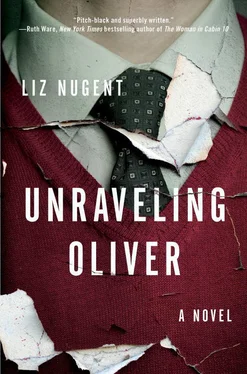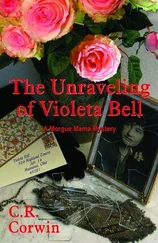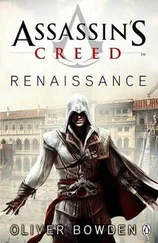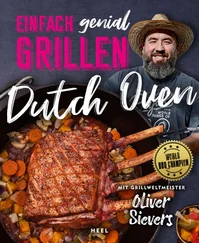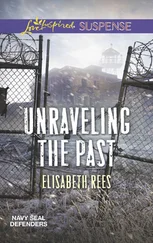Liz Nugent
UNRAVELING OLIVER
For my dad, John D. Nugent, with all my love
Iexpected more of a reaction the first time I hit her. She just lay on the floor, holding her jaw. Staring at me. Silent. She didn’t even seem to be surprised.
I was surprised. I hadn’t planned to do it. Usually when you hear about this kind of thing, it is the 1950s, and the husband comes home drunk to his slovenly wife from the pub and finds that his dinner is cold. On the contrary, it was November 12, 2011, a wintry Saturday evening on a south Dublin avenue, and Alice had prepared a delicious meal: lamb tagine, served on a bed of couscous, with pita bread and a side dish of mint yogurt. Though the lamb was a tad lukewarm by the time she presented it, I really couldn’t fault it. I had washed the meal down with two glasses of Sancerre while Alice prepared the raspberry roulade for serving. I certainly wasn’t drunk.
But now, here she lay, the lower half of her body nearly hidden behind the legs of our mahogany dining table, her arms, head, and torso curled inward like a question mark. How had she fallen into that shape? There must have been considerable force behind my closed fist. If the glass had been in my hand, would I have stopped and put it down before I hit her? Or would I have smashed it into her face? Would it have shattered on contact and torn her pale skin? Could I have scarred her for life? It’s very hard to know. The words that come to mind are “circumstances beyond our control.” I emphasize the word “our” because, although I should not have done it, she really should not have provoked me.
The phone rang. Maybe I should have ignored it, but it might have been important.
“Hello?”
“Oliver. It’s Moya. How are things?”
These rhetorical questions irritate me. “How are things,” indeed.
Sorry, Moya, I’ve just punched Alice in the face, and she’s lying on the floor. And we’ve had a marvelous dinner.
Of course, I didn’t say that. I made some ham-fisted attempt at an excuse and bade her farewell. I waited for the reciprocal adieu.
There was a moment’s silence and then:
“Don’t you want to know how I am? Where I am?”
I was short and to the point. “No.”
Another silence. And then, whispered, “Oh, right, okay, is Alice there?”
Go away, you stupid, irritating woman.
I didn’t say that either. I told her that now was not a good time. She tried to inveigle me into a conversation, prattling about her new life in France. Even amid the turmoil, I could tell that she wanted me to be jealous. Bloody Moya. I ended the conversation politely but firmly.
I thought that the decent thing for me to do was to leave the house immediately. Not permanently, you understand. I thought there was more chance of Alice getting up off the floor if I wasn’t looming over her. I went to get my coat from its peg in the hall. It was a little difficult to fasten the buttons. My hands suddenly seemed to be too large for my gloves.
• • •
Two hours later, I was on my third brandy in Nash’s. Nervously I buttoned and unbuttoned my shirt cuffs. It is a habit from childhood, a thing I do when I am distressed. Even John-Joe commented on my rattled demeanor when he served me. Brandy would not have been my normal tipple. But I had had a shock, you see. Now I was drunk.
I wanted to phone Alice to see if she was all right, but I had left my cell phone in the house in my hurried exit, and I thought that perhaps borrowing somebody’s phone would make a bigger deal of the situation than it warranted. Don’t get me wrong, I knew it was serious. A significant error of judgment had been made. She should not have ended up on the floor.
I am aware that I am not the easiest of people. Alice has told me so. I have no friends, for example. I used to, many years ago, but that really didn’t work out. We drifted apart and I let them go—voluntarily, I suppose. Friends are just people who remind you of your failings. I have several acquaintances. I have no family either to speak of. Not in the sense that matters.
Over the years, Alice has never pried, has never been too curious. In fact, I would describe her as habitually obedient with just an occasional rebellion. I am not, have never been, violent.
I went to the bar and bought a packet of cigarettes. Strong ones. I was worried that my hands were still unsteady. Isn’t brandy supposed to help at a time like this? Or is that an old wives’ tale? Old wives.
Outside in the “beer garden” (a yard with half a roof beside the front door), I lit my first cigarette in years. Barney Dwyer, a neighbor from the Villas, approached from the public bar. Barney spent more time in the beer garden than inside the pub.
“Thought you quit?” he said.
“I did.”
“Jaysus,” he said, a swagger in his voice, sucking on a Rothmans, “they couldn’t break me.”
Here we go. Barney prided himself on his forty-a-day habit. When the smoking ban was introduced, most of us did our best to quit. I am proud to say that I was the first to succeed. I became known as the man with a “will of iron.” Barney, on the other hand, made no such attempt. If Barney had never smoked, he would have started the day the ban was introduced. A contrary bugger if ever there was one. Thin head, big ears.
“Welcome back,” he said.
“I’m not back . I’m just having the one. It’s been a bad day.”
“Jaysus, Oliver, it’s never just the one. You’re back on the smokes. Face it.”
I threw my almost-smoked cigarette on the ground. Stamped on it. Tossed the packet containing nineteen cigarettes at Barney.
“Keep them,” I said. “Go on, kill yourself.”
• • •
My wife had finally brought out the worst in me. It was most unexpected. I had always been fond of her, in my way. She was a marvelous cook, for example, after all the gourmet cuisine courses I made sure she attended. Also, she could be very athletic in bed, which was nice. It is terribly sad to think of such things now, considering her current state.
We met at the launch of a book she had illustrated back in 1982. My agent wanted me to meet her. He had suggested that she could do the illustrations for a children’s book I’d written that he was pushing around to publishers. I resisted the idea of illustrations initially. They would just distract from my text, I thought, but my agent, I admit it, was right. The drawings made my books far more marketable. We were introduced and I like to think there was an immediate… something. “Spark” is not the right word, but an acknowledgment of sorts. Some people call that love at first sight. I am not so naïve.
Neither of us was in the first flush of youth. Both in our late twenties, I think. But she was lovely in a soft way. I liked her quietness and she made little or no demands on me. She just accepted whatever attention I gave her and then withdrew into the background without complaint when I didn’t require her presence.
The wedding happened very quickly. There was nothing to be gained by waiting around. Her frail mother and half-witted brother stood behind us at the altar. No family on my side, of course. We didn’t bother with the palaver of a hotel reception. We had a rowdy meal in a city-center bistro owned by a former college friend, Michael. Barney was there. Back then I quite liked him. He was very emotional at the wedding, more than anybody else. One couldn’t blame him, I suppose.
Читать дальше
